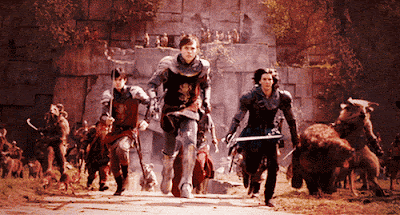"THE CHRONICLES OF NARNIA: PRINCE CASPIAN" (2008) Review
I must admit that it took me quite a while to write a review of the 2008 cinematic installment of "THE CHRONICLES OF NARNIA" saga. This second installment, "PRINCE CASPIAN", tells the story of four Pevensie children’s return to Narnia to aid Prince Caspian (Ben Barnes) in his struggle for the throne against his corrupt uncle King Miraz (Sergio Castellitto). I tried to think of something different about this chapter in compare to the first - "THE LION, THE WITCH AND THE WARDROBE". But it occurred to me that my reaction to this movie seemed more or less the same as the 2005 release.
And what does that say about my feelings about "PRINCE CASPIAN"? Honestly, I thought it was a solid and entertaining film that both children and adult fans of C.S. Lewis’ saga might enjoy. That is all I can really say. There was nothing really unique about it. Like many other adaptations of literary works, "PRINCE CASPIAN" did not faithfully follow its literary counterpart. Considering that I have never read any of Lewis’ works, I was not particularly disturbed by this. The only reason I am aware of any differences between the literary and cinematic versions, is the Internet.
Like the previous movie, the cast is pretty solid. The actors who portrayed the Pevensie children returned for this sequel. Due to the rapid aging of children in general, work on the script began before "THE LION, THE WITCH AND THE WARDROBE" was released, so filming could begin before the actors grew too old for their parts. William Moseley (Peter), Anna Popplewell (Susan), Skandar Keynes (Edmund) and Georgie Henley (Lucy) all gave solid, yet slightly uninspiring performances as the four siblings. Whereas Keynes got the chance to show Edmund at his peevish worst in the previous film, Moseley portrayed a slightly darker side of oldest brother Peter, whose dissatisfaction with being back in England had produced boorish personality. Perhaps I should rephrase that. Peter’s boorishness, which had been hinted through his handling of Edmund in the first film, was allowed to flourish in this film. It took a military failure against the main villain to give him a boot in the ass to improve his personality. On the other hand, Edmund seemed remarkably changed for the better in this film. One critic had described him as being the film’s "Han Solo". I would agree, except Edmund came off as more mature and intelligent than Han Solo. Anna Popplewell had convinced producer Douglas Gresham to allow Susan to appear in the movie’s major battles, because she feared the character came off as too passive in Lewis’ novel. Many fans of the novel were appalled by this. Not being a literary fan of the saga, it did not bother me at all. At least it gave her something to do. Of all the Pevensie siblings, Georgie Henley’s Lucy seemed to have changed the least. Although she seemed less tolerant of Peter’s boorishness than she was of Edmund’s darker side in the first film.
British actor Ben Barnes portrayed the title role of Prince Caspian of Telmarine with as much solid competence as the four actors who portrayed the Pevensies. Perhaps he seemed a little more competent than his younger co-stars in acting skills, but I could not sense anything remarkable about his performance. Portraying Caspian’s evil uncle and the Telmarine’s false ruler, King Miraz, was actor Sergio Castellitto. He made a very effective villain, but lacked Tilda Swanton’s memorable portrayal as the White Witch. Who, by the way, briefly returned to bring a much-needed spark in the middle of the story. If I must be honest, her brief appearance was probably the best scene in the film. But not even Swinton’s spectacular appearance could not overshadow what I feel was the best performance in the movie – namely that of Peter Dinklage as Trumpkin, a cynical red dwarf. I really enjoyed his sharp and caustic take on the dwarf, who is skeptic of the idea of Aslan and magic.
As much as I enjoyed "PRINCE CASPIAN", I must admit that I found it no more remarkable than the first film. Also, I found it difficult to maintain interest in the film’s first half, as it switched back and forth between Caspian’s flight from his murderous uncle and the Pevensies’ arrival in Narnia. Director Andrew Adamson seemed to lack George Lucas and Peter Jackson’s talent for seamless transition between multiple story lines within one film. But once the Pevensies and Caspian finally met, the movie seemed to discover its pace as it flowed toward the heroes’ ill-fated attempt to attack upon Miraz and the final showdown. There were two scenes that gave me a sense of déjà vu – namely the attacks of the trees and the river god upon the Telmarine army. It seemed as if either Adamson or Lewis had a Tolkien moment. The attack of the trees especially reminded me of the Ents’ attack upon Isengard in the 2002 movie, "LORD OF THE RINGS: THE TWO TOWERS".
"PRINCE CASPIAN" was not the greatest movie I had seen during the summer of 2008. Nor is there anything unique about it. But if one can overcome the fact that it is not an exact adaptation of C.S. Lewis’ novel, he or she might find the movie quite entertaining to watch. I heartily recommend it.




































